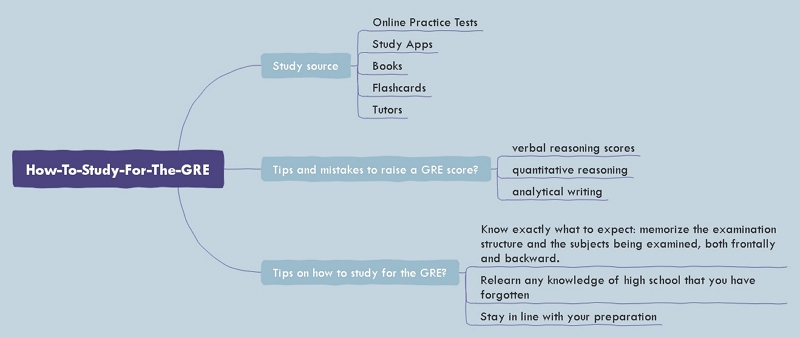Complete Guide To SAT Preparation


Graduate Record Examination, or GRE, is an important step in applying for a graduate or business school. The GRE is a multi-choice, computer-based, standardized examination that is often required globally for admission to graduate programs and graduate business (MBA) programs. There are many ways to answer - how to study for GRE? Firstly, it is important to know the definition of GRE.
Most people require about 2-4 months between the time they start studying for the GRE and their application deadlines. You will need to take the GRE at least three weeks before your earliest application deadline so schools will have enough time to get their scores.
The number of weeks you will need to study will be based on how many points you want to improve your score and how many hours you can study each week.
Study Apps
The GRE General Test can be taken in more than 1,000 test centers in more than 160 countries and is also available online. The test is open year-round continuously in most regions of the world.
GRE registration can be easily completed online by making an ETS account at the Education Testing Service’s website. First, you need to find out which test center is accessible and the time slots available to book the test. GRE fees are payable via credit card or debit card.
It is highly recommended that you register early for your preferred GRE test date so you can select a date that allows sufficient time for ETS to process your scores and send them to the institutions to which you will apply.
The Test Fee for GRE,nbsp;
The cost of taking the GRE is $205 for all test locations other than China. The fee includes sending score reports to up to four of your choice Graduate institutions.
The GRE Subject Test costs $150. If the applicants also wish to change the center or reschedule the test, they would be required to pay an additional fee.
General Test
Students seeking admission to MS courses appear for the GRE General Test in various streams in the United States and other countries. This test evaluates a candidate on his analytical writing skills, quantitative ability, and verbal reasoning skills.
Verbal reasoning section -
The section on verbal reasoning contains three types of questions: equivalence of the sentence, completion of the text, and interpretation of the reading. GRE's section on verbal reasoning is often said to be a vocabulary test. The questions, however, require good reading and reasoning skills.
Analytical writing section -
The section on analytical writing has two tasks of writing essays: Issue and Argument. The ‘issue’ task’ presents two topics that must be selected by the candidate to write an essay explaining the writer's position on the subject.
A statement of a position presents the task of ‘argument.’ The candidate must analyze the logic of the position given and suggest how and where the reasoning may be incorrect or need improvement.
Quantitative reasoning -
Quantitative reasoning is divided into two types - quantitative comparisons and problem-solving. The test also includes questions on numeric entry where students must provide their answers.
The math knowledge level should be within a 10th-grade student's grasp. Some of the questions are about interpreting the data. Students taking the computer-based test shall be provided with an on-screen calculator.
GRE Subject Test
The GRE Subject Test assesses the ability of the candidates on a given subject. The subject tests are conducted in the following subject areas: Mathematics, Literature (English), Physics and Psychology, Biology, Chemistry, and Biochemistry (Cell and Molecular Biology).
Biochemistry - The GRE test for biochemistry, cell, and molecular biology includes 170 multiple-choice questions. A certain percentage of those questions are grouped into sets towards the end of the test, responding to a description of a laboratory experiment or a specific diagram.
Biology - The test is made up of around 188 multiple-choice questions. The key areas to study for this subject are - Cellular and Molecular Biology, Organismal Biology, and Ecology and Evolution.
Chemistry ,nbsp;-,nbsp;The test is composed of about 130 multiple-choice questions. The test content emphasizes the four fields that have traditionally been divided into chemistry: Analytical, Inorganic, Organic, and Physical Chemistry.
Literature in English ,nbsp;- The test comprises around 230 multiple-choice questions themed into four main areas: Literary Analysis, Identification, Cultural and Historical Contexts, and Literary Criticism History and Theory.
Physics - The test comprises around 100 multiple-choice questions covering Classical Mechanics, Electromagnetism, Atomic Physics, Optics and Wave Phenomena, Quantum Mechanics, Special Relativity, Laboratory Methods, and specialized topics.
Psychology - ,nbsp;The test comprises approximately 205 multiple-choice questions covering experimental, social, and general psychology topics.
GRE General Tests assess your critical thinking and analytical abilities, as suggested by the name. Irrespective of your area of study, this test is significant, as many universities use these scores as a factor of qualifying for admissions.
On the other hand, GRE Subject Tests are created to evaluate your relevant knowledge regarding your area of interest. These tests are usually taken by prospective applicants who are majoring in specific subjects.
The former is offered year-round at test centers. The latter is carried out on pre-determined dates at specific locations.
Sources of Study
There's no proper way of preparing for the GRE. The test itself may be standardized, but you should tailor your study method based on your strengths, weaknesses, and habits of study.
1.Online Practice Tests - Resources for online practice testing provide sample GRE tests that you can take to get used to the questions you will see on the exam. Typically, these online exams are free or are offered on an annual subscription basis.
2.Study Apps - The growing pool of study apps provides new, interactive ways of preparing for the GRE. Edraw MindMaster is one such app that will help you prepare for GRE.
MindMaster is an easy-to-use, flexible mind mapping tool designed to help you generate mind maps that are great for studying. By combining GRE tests’ bullet points into a mind map, MindMaster lets you organize the concepts and create a map to help you study.
3.Books - There are a plethora of GRE test preparation books available in the market. They provide all the tips to hack your way to a great GRE score. Most large bookstores have a book section for testing, where you can find great books for GRE preparation.
4.Flashcards - The use of flashcards can undoubtedly benefit your GRE preparation program, which allows you to question yourself about vocabulary words and mathematical concepts.
5.Tutors - Typically, GRE tutors are young adults that have excelled in standardized testing. They can give you tips, help you solve problems in practice, and focus on your weaknesses.
- Know what to expect: memorize the examination structure and the subjects being examined, from cover to cover.
- Relearn any high school teachings that you might have forgotten: many GRE questions are based on simple concepts that you breezed through in high school.
- Stay in line with your preparation: Make a study plan and stick to it, even if it merely cuts out small chunks of time every day. Diligence is especially crucial if you are not attending a prep program.
After completing the test, the GRE General Test can expect to receive three scores, including verbal reasoning, quantitative, and analytical writing. Verbal and Quantitative scores range from 130-170. Writing scores can be as low as zero and as high as six, and these scores are assigned in incremental half-point.
1.Before the Night
The GRE is a four-hour brain marathon, and you should always rest the night before a marathon. Focus on relaxing, eating healthy, and getting a good night's sleep, so you're ready for the exam.
Do’s -
- Get a good day's sleep
- Dress comfortably, and be ready to excel
- Know the four schools to which you submit scores
Don’ts -
- Stay up late, the night before
- Strenuously work out the night before
- Bring your books to the test center.
2.On The Day
The testing experience is extremely controlled, and it rigorously enforces a quiet, focused environment. Typically, friends or family are not allowed to wait for you to complete the exam in the test center. You'll be offered the opportunity to cancel your scores at the end of the exam.
Things to Bring With You
- Your admission ticket and your personal ID
- A sweater
- Three or four sharpened No. 2 of HB pencils
- A Quality eraser
Things to Leave At Home
- Mechanical pencils/ pens
- Recording Devices/ photographic devices / cell phones
- Your personal calculator
- Alarms watch





